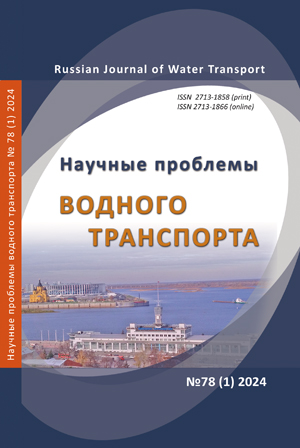Elements of technology for processing and disposal of food waste during the operation of ships
Abstract
This article is devoted to the problem of environmental protection by food waste, which is most relevant for water tourism facilities, as well as small and remote settlements. The authors propose, when solving the problem of food waste, to consider the process of their formation, examining the complete process of existence of food products, taking into account their movement in space and transformations, as a result of which waste is formed. This approach allowed us to establish the main stages of this process – preparation for cooking, preparation, and consumption. It is shown that each of them generates waste in different amounts and of different properties. It is also shown that these factors, in turn, determine the most effective technologies and means of processing and recycling food waste. The authors propose, by managing the amount of waste generated, taking into account the quality, to form technologies and means for recycling and disposal of waste. The advantages of this approach are confirmed by examples of ecological solutions that take into account the formation of waste in the process of food transformation, as well as their movement in space, which simultaneously ensures the availability of different solutions to the waste problem for each specific object, including such as water tourism facilities. The availability of different options for solving the waste problem provides the opportunity to choose the most effective solution in the context of organizing a solution to the problem of food waste.
References
Федеральный закон от 24.11.1996 N 132-ФЗ (ред. от 25.12.2023) «Об основах туристской деятельности в Российской Федерации».
Федеральный закон от 24.06.1998 N 89-ФЗ (ред. от 04.08.2023) "Об отходах производства и потребления" (с изм. и доп., вступ. в силу с 01.01.2024)
Распоряжение Правительства РФ от 25.01.2018 N 84-р (ред. от 13.10.2022) «Об утверждении Стратегии развития промышленности по обработке, утилизации и обезвреживанию отходов производства и потребления на период до 2030 года»
Приказ Росприроднадзора от 22.05.2017 N 242 (ред. от 16.05.2022) «Об утверждении Федерального классификационного каталога отходов» (Зарегистрировано в Минюсте России 08.06.2017 N 47008).
Международная конвенция по предотвращению загрязнения с судов 1973 года и Протокол 1978 года. — СПб.: Изд-во ЦНИИМФ, 2008. — 706 с.
Правила Речного Регистра: в 4 т. — М.: Речной регистр, 2008. — 1430 с.
Смирнов А.Б., Смирнова Л.И., Смолокуров, Роль экологического обеспечения в государственном регулировании водного туризма Журнал «Экономика и предпринимательство». 2019. - №7. - с. 519-524.
Решняк В.И., Морозова Е.М., Каляуш М.С., Экологическое обеспечение водного туризма Журнал «Эксплуатация морского транспорта» Государственного морского университета им. адм. Ушакова Ф.Ф., 2021. - №14(98). - с. 68-73. DOI 10.34046/.
Экологическое обеспечение водного туризма / В. И. Решняк, О. Л. Домнина, А. Е. Пластинин, Н. С. Отделкин // Морские интеллектуальные технологии. – 2019. – № 4-2(46). – С. 154-160.
Корнев, А. Б. Пути развития экологической безопасности региона / А. Б. Корнев, О. Л. Домнина, А. Е. Пластинин // Великие реки'2016 : Труды научного конгресса 18-го Международного научно-промышленного форума: в 3-х томах, Нижний Новгород, 17–20 мая 2016 года / Нижегородский государственный архитектурно-строительный университет; ответственный редактор А. А. Лапшин. Том 1. – Нижний Новгород: Нижегородский государственный архитектурно-строительный университет, 2016. – С. 90-92.
Калугин В.Н., Корнилов Э.В., Кулешов И.Н., Тезхнология переработки мусора на судах. Инсенераторы.изд-во «Негоциант», 2006 . - 52 с.
Баширов В.Д., Левин Е.В., Сагитов Р.Ф., Алямов И.Д., Гулак М.З., современные технологии сепарирования и переработки ТБО, Известия Оренбургского государственного аграрного университета, 2014. - №3(47). - с. 77-80.
Инсинераторы и мусоросжигательные заводы ABONO для обезвреживания и утилизации твердых, жидких и газообразных отходов. URL: https://abono.ru/lp_cremator/?yclid=2813800743765278719.
Домашние компостеры и контейнеры для переработки пищевых отходов. URL: https://rcycle.net/othody/pishhevye/kuhonnye-kompostery-dlya-pererabotki-v-udobreniehttps://rcycle.net/othody/pishhevye/kuhonnye-kompostery-dlya-pererabotki-v-udobrenie?ysclid=lq9aqh22at997860680.
Copyright (c) 2024 Russian Journal of Water Transport

This work is licensed under a Creative Commons Attribution 4.0 International License.













